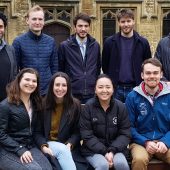
Professor Rebecca Eynon
Professor of Education, the Internet and Society
Rebecca Eynon's research focuses on learning and the Internet, and the links between digital and social exclusion.

MOOCs facilitate learning through large-scale, semi-synchronous exchanges between a global body of lifelong learners. Yet, few researchers have explored how these learners communicate and collaborate – arguably, the most significant differentiator of MOOCs from prior large-scale online learning initiatives (such as MIT OpenCourseWare).
Through varied in-depth qualitative study, complex network analysis, and machine learning, our prior research revealed: the structural properties of communication in MOOCs, including information diffusion; “communication communities” that can be inferred based on discussion forum content; and raised questions of ethics and inequality in education. A particularly compelling finding from this study was the relatively low proportion of MOOC registrants that post in the discussion forums. A major reason for this lack of participation is a feeling of helplessness: learners see the vast amount of content being generated in the discussion forums and do not know where or how to participate in order to engage with their peers.
A key question then is the extent to which social learning can be supported in these large online crowds. This project aims to examine this question by using MOOC data to:
Alongside these computational social science techniques, we aim to explore the wider social, educational and ethical implications of this kind of approach to researching and facilitating learning at scale.
This research is supported by Google.

Professor of Education, the Internet and Society
Rebecca Eynon's research focuses on learning and the Internet, and the links between digital and social exclusion.

Research Associate
Isis is a cultural sociologist focusing on emerging practices related to networked technologies. She is currently researching microwork and virtual production networks in Sub-Saharan Africa and Southeast Asia with multiple colleagues at the OII.

Former Senior Research Fellow
Taha Yasseri analyses large-scale transactional data to understand human dynamics, collective behaviour, collective intelligence and machine intelligence.

Department of Engineering, University of Oxford